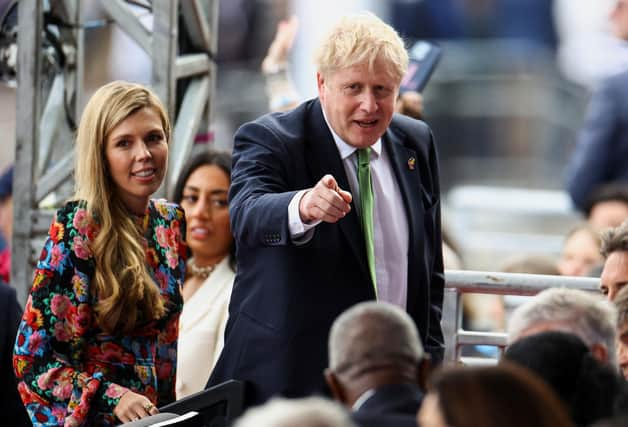Boris Johnson confidence vote: Here's all you need to know before tonight


At least 54 MPs have sent letters to Sir Graham Brady, chair of the backbench 1922 Committee, the threshold required to trigger such a vote.
The Prime Minister apologised after the release of the Sue Gray report for a series of parties held at Number 10 Downing Street in breach of restrictions when the country was in lockdown due to the Covid-19 pandemic.
Why is a vote being held?
Advertisement
Hide AdAdvertisement
Hide AdWhile some MPs may be satisfied that the Partygate issue has been dealt with now the Met has concluded its investigation and Sue Gray has published her report, many still feel an apology from Mr Johnson is not enough and he needs to be replaced.
Letters of no confidence have been submitted over the past few months and today, Sir Graham announced at least 54 MPs (15 per cent of Conservatives in the Commons) had written to him. The 1922 Committee is a Parliamentary group which represents all backbench Tory MPs and is seen as an incredibly influential body.
What happens tonight?
The vote is expected to take place between 6-8pm tonight (Monday June 6). It will be held via secret ballot so nobody will know which way individual MPs vote unless they make it public.
To survive all Mr Johnson requires is a majority. But if he loses a leadership election would be triggered, one which Mr Johnson would not be allowed to stand in.
What happens if Mr Johnson survives?
Advertisement
Hide AdAdvertisement
Hide AdIf Mr Johnson does win, he would be safe from facing another challenge for a year.
In this scenario his position might either be strengthened if those who voted against him accept the result, or it might be weakened if his authority has been undermined.
He may decide to resign even if he wins the vote, if he feels his position is untenable.
Would the Conservatives lose a general election with Mr Johnson leading them?
Advertisement
Hide AdAdvertisement
Hide AdAlthough many question the reliability of polling in today’s day and age, they all currently show Labour ahead by several points. If accurate they would point to a heavy general election loss for the Conservatives.
December saw a stunning by-election win for the Lib Dems in North Shropshire following the resignation of Owen Paterson.
Meanwhile there are two other key by-elections coming up: Wakefield after former Conservative Imran Ahmad Khan was convicted of sexually assaulting a minor and Tiverton and Honiton in Devon where Neil Parish stood down after admitting viewing pornography on his phone in the House of Commons chamber.
If Mr Johnson does continue as PM and the Conservatives lose both these by-elections, alarm bells might start ringing among the political parties’ higher ups.
Advertisement
Hide AdAdvertisement
Hide AdBy-elections are not always entirely on the nose in predicting subsequent general elections, so the party may still feel that Mr Johnson could pull off a repeat of his 2019 win.
What happens if the PM loses?
Leadership contests for the Conservative Party consist of two stages: the first sees MPs choose two shortlisted candidates and then the party’s membership vote on a one member-one vote basis.
Any MP standing has to gain the support of eight colleagues.
Who would be in the running to replace Johnson as PM?
Chancellor Rishi Sunak was once tipped as a favourite to be the next Prime Minister, but his star has waned as the country grapples with the cost of living crisis and revelations about his wife’s tax status. Foreign Secretary Liz Truss is often mentioned as a possible successor to Mr Johnson, while Defence Secretary Ben Wallace is another cabinet member viewed favourably by Conservative Party members. Penny Mordaunt and Jeremy Hunt are two names outside the current government who some believe may throw their hats into the ring.
Who has already called for Mr Johnson to resign?
Advertisement
Hide AdAdvertisement
Hide AdFormer Foreign Secretary Jeremy Hunt says he will vote against Mr Johnson, while John Penrose has resigned as the government’s anti-corruption champion over Partygate. Steve Baker and David Davis, both staunch Brexiteers, have called on the PM to step down.
In Sussex, only two Conservative MPS have so far gone public and called on Mr Johnson to go. These are Tim Loughton, East Worthing and Shoreham MP, and Nick Gibb, Bognor Regis and Littlehampton MP.
On Partygate, Mr Loughton said: “Obfuscation, prevarication and evasion have been the order of the day when clarity, honesty and contrition was what was needed and what the British people deserve.”
Meanwhile Mr Gibb described how his constituents’ are furious about the double standards – imposing harsh and, to my mind, necessary restrictions as we and the world sought to defend ourselves against this new and deadly virus, while at the same time flagrantly disregarding those rules within the fortress of Downing Street’.
Who has signalled support for the PM?
Advertisement
Hide AdAdvertisement
Hide AdMost of the cabinet have publicly declared their support for Mr Johnson with no sign so far of any high-profile figures breaking ranks with one saying there was ‘no doubt’ he would win the vote tonight.
With a number of Sussex’s Conservative MPs holding positions in the government, the consensus is that most of them will back the PM. These include Chichester’s Gillian Keegan (care minister), Mid Sussex’s Mims Davies (employment minister), Lewes’ Maria Caulfield (patient safety and primary care minister), Horsham’s Jeremy Quin (defence procurement minister) and Arundel and South Downs’ Andrew Griffith (minister for policy and head of the Prime Minister’s policy unit).